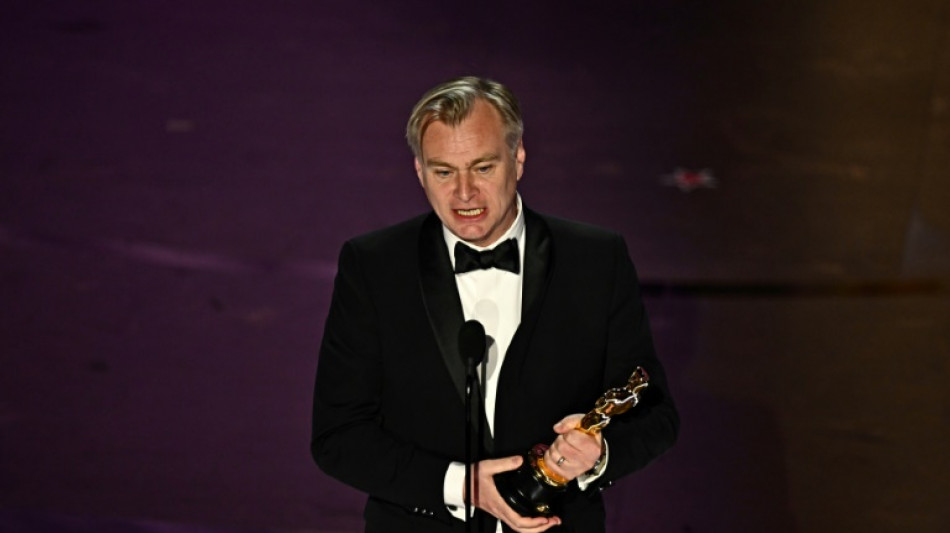
From 'Batman' to best director, Nolan stamps unique mark on Hollywood

Christopher Nolan, the indisputable Hollywood hitmaker whose ambitious and challenging blockbusters entice mainstream audiences and cult followings alike, finally confirmed his artistic pre-eminence with the Oscar-sweeping "Oppenheimer."
The British-American filmmaker -- an obsessively punctual, tea-swilling perfectionist, who is known for combining inventive, intellectual playfulness with an emphasis on realism -- was named best director at the Academy Awards on Sunday.
"Movies are just a little bit over 100 years old," Nolan told the audience at the Dolby Theatre.
"We don't know where this incredible journey is going from here. But to know that you think that I'm a meaningful part of it means the world to me."
It is the high point -- so far -- of a career that has taken Nolan from arthouse darling ("Memento") to superhero savior (the "Dark Knight" films) to rare purveyor of original sci-fi ("Inception," "Interstellar") in a market dominated by sequels.
Nolan, 53, had come close to Oscars success in the past, most notably with his stunning 2017 war epic "Dunkirk."
But the director -- sometimes dismissed by critics as a masterful technician and genre-bound filmmaker rather than a true visionary auteur -- had never won an Oscar before "Oppenheimer," which dominated Sunday's gala, taking seven statuettes overall.
Born in 1970, the son of a British advertising copywriter and an American air hostess, Nolan had a distinctly trans-Atlantic childhood.
After watching "Star Wars" and a re-release of "2001: A Space Odyssey" in theaters at the age of seven, Nolan quickly began making films on his father's old Super 8 camera.
Nolan attended an austere boarding school before studying English literature at University College London -- which he chose in part for its filmmaking facitilities.
While there, he met and ran a movie society with his future wife and producer, Emma Thomas, who he followed to Los Angeles after graduating.
Nolan came to fame at age 30 with "Memento." A fiercely intelligent and twisty avant-garde noir with the non-linear narrative that has become his hallmark, it was a festival hit and earned the director his first Oscar nomination, for its screenplay.
- 'Proud' -
Nolan's big-budget directorial debut was 2002's "Insomnia," which starred Al Pacino as an LA cop sent to investigate a murder in Alaska.
Veteran director Steven Soderbergh recommended Nolan to Warner Bros, and later recounted a conversation he had with Pacino on the movie's set.
"I can tell you right now, at some point in the very near future, I'm going to be very proud to say I was in 'a Christopher Nolan movie,'" Pacino told Soderbergh.
The movie's success enabled Nolan to pitch Warner his gritty, realistic vision for the new Batman films the studio was planning.
The resulting "Batman Begins" kick-started a trilogy of Nolan-directed movies starring Christian Bale as the caped crusader.
Part two, "The Dark Knight," is often considered the greatest superhero film ever made. It was certainly the first to gross $1 billion, and the first to earn an acting Oscar, a posthumous prize for Heath Ledger as the villainous Joker.
The third, "The Dark Knight Rises," drew less critical acclaim, but remains the biggest commercial hit of Nolan's, in a career filmography that has grossed more than $6 billion.
In amongst those films, Nolan released "The Prestige," a period thriller about two duelling stage magicians, played by Bale and Hugh Jackman, and "Inception."
- Nuclear -
"Inception," a wildly ambitious heist movie in which Leonardo DiCaprio and Marion Cotillard hop between nested dream worlds, consolidated Nolan's reputation as a unique Hollywood filmmaker who could obtain big budgets and total creative control for original movies -- and still return a profit.
It won four Oscars, including for its stunning visual effects, and earned Nolan his first individual Academy Award nominations since "Memento."
His next original sci-fi, "Interstellar," claimed another visual effects Oscar, and kick-started Nolan's ongoing collaboration with esteemed theoretical physicist Kip Thorne.
Nolan then turned his attention to the past with "Dunkirk," a tense retelling of the storied World War II evacuation of hundreds of thousands of Allied troops from a beach in northern France.
The movie earned Nolan his first best director nomination, and its 1940s period setting foreshadowed "Oppenheimer."
Likewise, his next movie "Tenet" -- another ambitious, original sci-fi -- introduced Nolan's concern with nuclear armageddon.
But it was reading "American Prometheus" -- the 2005 Pulitzer Prize-winning biography of J. Robert Oppenheimer, the father of the atomic bomb -- that launched Nolan on the path to a film that would finally bring him Oscar glory.
He bested Martin Scorsese ("Killers of the Flower Moon"), Jonathan Glazer ("The Zone of Interest"), Yorgos Lanthimos ("Poor Things") and Justine Triet ("Anatomy of a Fall") for the best director statuette.
R.Lagomarsino--PV
